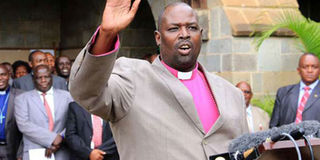Politicians should take lessons on consensus from Anglicans

Anglican Church of Kenya Archbishop Jackson Ole Sapit addresses the public after he was elected on May 20, 2016. He emerged as favourite and eventually took the main seat. PHOTO | JEFF ANGOTE | NATION MEDIA GROUP
What you need to know:
- It is a tragedy that lives have been lost and thousands of man-hours squandered over an issue involving picking the referee for the 2017 elections.
- The President and the Cord leader simply need to escape their twin prisons (of triumphalism and victimhood) and understand that Kenya is bigger than the two of them.
How were disputes in traditional African society resolved? It was simple, Julius Nyerere said.
People just sat under a tree and talked and talked until they agreed. In the Zambian statesman Kenneth Kaunda’s words: “In our original societies, we operated by consensus. An issue was talked out in a solemn conclave until such a time as an agreement could be reached.”
African elders must be amazed and embarrassed at the way the political class has held Kenyans hostage over the last month over a dispute that can be resolved through just a few hours of honest deliberation between the players involved.
It is a tragedy that lives have been lost and thousands of man-hours squandered over an issue involving picking the referee for the 2017 elections.
If the pre-election hostilities are this high, what happens when the real game begins?
Yet, there is always a ray of hope and the Anglicans provided it last week. For more than a month, senior clergymen have been campaigning to take over from the retiring Archbishop Eliud Wabukala.
Like all major competitions in the country, a sub-text soon emerged, with the leading candidates hailing from the Luo and Kikuyu communities.
Behind the scenes, this development alarmed church elders. They understood the potential for the church to end up being divided amid the nation’s polarised politics.
So work began to find consensus between the candidates and when a pre-election deal could not be struck, according to reporters who were tracking the poll and were in touch with delegates, word was quietly sent out to delegates that they should pick a compromise candidate.
That is how Jackson Nasoore ole Sapit, the Bishop of Kericho and a member of the Maasai community, which is not directly implicated in the major tussle of Kenya’s “high politics,” emerged as favourite and eventually took the main seat.
That is as African an approach as they come, mixing wisdom with common sense and still emerging with a successful candidate who is well qualified and broadly acceptable.
THE PRIMITIVE METHOD
The Anglican church came out stronger at the end of the election period.
It is a process that would have met with the approval of the Ugandan scholar Wilfred Lajul who notes in African Philosophy that among all African societies, decisions were arrived at by consensus.
The succession plan after a chief died, for example, was crafted by elders who simply sat down and reached agreement.
Apparently, the announcement of the death of the chief would usually be delayed until the elders picked a successor.
In some cases, Lajul writes, where there was hereditary succession, they would have some interesting methods of choosing the new leader, including by placing a special bead in a meal and serving it to the sons of the dead chief.
Whoever found the bead in his portion would emerge as the new chief of the Alur people in the Congo.
We have spent too much time watching CNN and learning and adopting all our systems from the lens of confrontational democracies in the West.
Those systems too often fly against African traditions and are very difficult to apply where ethnicity is as big an issue as it is in Kenya.
It is unacceptable that a dispute such as the composition of the IEBC should result in a seeming inability of the political class to thrash out a deal that keeps the nation moving along without bitter divisions and even deaths.
Finding consensus cannot be that hard. The President and the Cord leader simply need to escape their twin prisons (of triumphalism and victimhood) and understand that Kenya is bigger than the two of them.
They will leave a better nation behind by acting more like the African leaders of old (or the wise Anglican elders of today).
DISAPPOINTING
Can the Supreme Court judges really be serious? Even before the ink had dried on the landmark Court of Appeal judgment about the correct age of retirement in a case involving two Supreme Court judges, the same Supreme Court on which those two judges sit pronounced itself.
It stayed the orders requiring its judges to go home at the age of 70 as the constitution unambiguously demands and will now sit to hear that very matter.
Forget about the fact that they didn’t seem to have to wait, like normal litigants, for the lower court’s judgment to be printed and certified before then lodging their appeal, a painful and tedious process that will be familiar to anyone who has filed an appeal in Kenya.
Forget, too, what their interpretation of the letter of the law is. But do they not care how they look in the eyes of the public with such actions?
Where do we get these judges from?
[email protected] @mutigam





